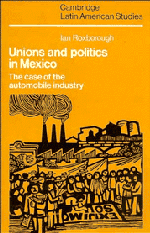Book contents
- Frontmatter
- Contents
- List of tables
- List of figures
- Acknowledgements
- Dedication
- Preface
- List of abbreviations
- Map: Location of automobile plants
- 1 Organized labour in Mexico
- 2 The Mexican automobile industry
- 3 Wages and workers in the Mexican automobile industry
- 4 The unions: a historical analysis
- 5 The unions: power and organization
- 6 Control over work processes
- 7 Union government
- 8 The labour courts
- 9 The empirical findings and the dynamics of industrial militancy
- 10 Unions and political stability in Mexico
- Notes
- Bibliography
- Index
- CAMBRIDGE LATIN AMERICAN STUDIES
5 - The unions: power and organization
Published online by Cambridge University Press: 04 August 2010
- Frontmatter
- Contents
- List of tables
- List of figures
- Acknowledgements
- Dedication
- Preface
- List of abbreviations
- Map: Location of automobile plants
- 1 Organized labour in Mexico
- 2 The Mexican automobile industry
- 3 Wages and workers in the Mexican automobile industry
- 4 The unions: a historical analysis
- 5 The unions: power and organization
- 6 Control over work processes
- 7 Union government
- 8 The labour courts
- 9 The empirical findings and the dynamics of industrial militancy
- 10 Unions and political stability in Mexico
- Notes
- Bibliography
- Index
- CAMBRIDGE LATIN AMERICAN STUDIES
Summary
The aspect of union power which is considered in this chapter is primarily organizational. It concerns the ability of the union to function effectively as an organization at the plant and company levels, dealing with a range of industrial conflicts. In addition to the yearly or biennial negotiations over wages and contract revisions, trade unions are involved in a complex web of daily negotiations and conflicts with management. For the union to operate effectively in this sphere, a certain minimum level of institutionalization is required. This implies some degree of acceptance by management, some level of support and legitimacy from the workforce, and some measure of organizational resources for the union apparatus.
The autonomy and effectiveness of the union in the workplace can vary enormously, from situations where the workplace union is a mere cipher and real power rests with the union federation or with a political party, to situations where the workplace union is wholly autonomous and operates effectively entirely on the basis of its own resources. The unions in the Mexican automobile industry vary considerably along this continuum, as will be illustrated below.
The importance of this organizational power of unions is twofold. In the first place it affects the locus of economic bargaining. Only unions with a certain measure of organizational autonomy and power will be able to bargain independently of the support of national union federations.
- Type
- Chapter
- Information
- Unions and Politics in MexicoThe Case of the Automobile Industry, pp. 109 - 119Publisher: Cambridge University PressPrint publication year: 1984



